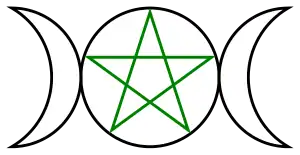Zsuzsanna Budapest
Zsuzsanna Emese Mokcsay (born 1940) is an American writer, activist, playwright and songwriter living in America who writes about feminist spirituality and Dianic Wicca under the pen name Zsuzsanna Budapest or Z. Budapest. She is the founder of the Susan B. Anthony Coven #1, which was founded in 1971 as the first women-only witches' coven.[1][2] She founded the female-only style of Dianic Wicca.[3]
Zsuzsanna Emese Mokcsay | |
|---|---|
| Born | 1940 |
| Nationality | American |
| Other names | Zsuzsanna Budapest, Z. Budapest |
| Alma mater | University of Vienna |
| Occupation(s) | Writer, activist, playwright, songwriter |
| Known for | Founder of Dianic Wicca, Founder of the Susan B. Anthony Coven |
She is the founder and director of the Women's Spirituality Forum , a nonprofit organization featuring lectures, retreats and other events, and was the lead of a cable TV show called 13th Heaven.[4] She had an online autobiography entitled Fly by Night, and wrote for the religion section of the San Francisco Examiner on subjects related to Pagan religions. Her play The Rise of the Fates premiered in Los Angeles in the mid-seventies. She is the composer of several songs including "We All Come From the Goddess".[5]
Early life and education
Z. Budapest was born in Budapest, Hungary. Her mother, Masika Szilagyi, was a medium, a practicing witch, and a professional sculptor whose work reflected themes of Goddess and nature spirituality. In 1956, when the Hungarian Revolution began, she fled to Austria as a political refugee. She finished high school in Innsbruck, graduated from a bilingual gymnasium, and won a scholarship to the University of Vienna where she studied languages.[6]
Budapest emigrated to the United States in 1959, where she studied at the University of Chicago, with groundbreaking originator of the art of improvisation, Viola Spolin, and the improvisational theater group The Second City.[6] She married and had two sons, Laszlo and Gabor, but later divorced. She realized she is a lesbian and chose, in her words, to avoid the "duality" between man and woman.[7]
Career
Budapest's first job in television was as a Color Girl for the CBS Network in New York, assigned to The Ed Sullivan Show.
Activism

Budapest moved to Los Angeles from New York City in 1970, and became an activist in the women's liberation movement. She was on the staff of the first Women's Center in the U.S. there for many years,[8] and became the Founder and High Priestess of Susan B. Anthony Coven #1, the first women-only witches' coven, which was founded in 1971.[6][1][2] She was responsible for the creation of an Anti-Rape Squad[9] and the Take Back the Night Movement in Southern California, and facilitated many of their street marches.[10]
Fortune telling and arrest
In 1975, she was arrested for "fortune telling" at her candle and book store in Venice, California following a "sting" by an undercover policewoman Rosalie Kimberlin, who received a tarot reading from her. Subsequently, Budapest was charged with violating a municipal by-law, Code 43.30, which made fortune telling unlawful. Budapest and her defense team described her as "the first witch prosecuted since Salem,"[11] and the ensuing trial became a focus for media and pagan protesters. Budapest was found guilty.[11]
Duly, Budapest and her legal counsel set out to establish Wicca, and more specifically Dianic Wicca, as a bona fide religion. The state's Supreme Court reversed the guilty verdict as unconstitutional and in violation of the Freedom of Religion Act.[12]
Following her conviction, she engaged in nine years of appeals on the grounds that reading the Tarot was an example of women spiritually counselling women within the context of their religion. With pro bono legal representation she was acquitted, and the laws against "fortune telling" were struck from California law.[12]
Later career
In the 1980s, she created the TV show 13th Heaven, which ran on syndicated cable in the San Francisco Bay area for seven years.[4]
Works
Books
- The Feminist Book of Lights and Shadows. Feminist Wicca. 1975. OCLC 38697963.
- Selene, the Most Famous Bull-Leaper on Earth. Diana Press. 1976. ISBN 0-88447-010-5.
- The Grandmother of Time: A Woman's Book of Celebrations, Spells, and Sacred Objects for Every Month of the Year. HarperOne. 1989. ISBN 978-0-06-250109-7.
- The Holy Book of Women's Mysteries: Feminist Witchcraft, Goddess Rituals, Spellcasting and Other Womanly Arts. Wingbow Press. 1989. ISBN 978-0-914728-67-2.
- Grandmother Moon: Lunar Magic in Our Lives—Spells, Rituals, Goddesses, Legends, and Emotions Under the Moon. HarperSanFrancisco. 1991. ISBN 0-06-250114-3.
- The Goddess in the Office: A Personal Energy Guide for the Spiritual Warrior at Work. HarperOne. 1993. ISBN 978-0-06-250087-8.
- The Goddess in the Bedroom: A Passionate Woman's Guide to Celebrating Sexuality Every Night of the Week. HarperSanFrancisco. 1995. ISBN 978-0-06-251186-7.
- Summoning the Fates: A Woman's Guide to Destiny. Three Rivers Press. 1999. ISBN 978-0-609-80277-9.
- With Diana Paxson
- Celestial Wisdom for Every Year of Your Life: Discover the Hidden Meaning of Your Age. Weiser Books. 2003. ISBN 978-1-57863-282-4.
Plays
- The Rise of the Fates: A Woman's Passion Play, 1976.
Films
- The Occult Experience (Motion picture). Cinetel Productions Ltd. 1987. Released on VHS by Sony/Columbia-Tristar on August 5, 1992.
See also
References
- Lewis (1999), p. .
- Berger, Leach & Shaffer (2003), p. .
- Adler (1981), Chapter 8: Women, Feminism, and the Craft.
- Chesler, Rothblum & Cole (1995), p. .
- Hutton (1999), p. .
- Lesbian Pride (n.d.)
- Drury (2000), p. 161.
- Endres & Lueck (1996), p. .
- Reid (2006), p. .
- Eller (1993), p. .
- Creeden (1999), p. .
- Davis (2006), p.
Works cited
- Adler, Margot (1981) [1979]. Drawing Down the Moon: Witches, Druids, Goddess-Worshippers, and Other Pagans in America Today. Beacon Press. ISBN 978-0807032374.
- Berger, Helen A.; Leach, Evan A.; Shaffer, Leigh S. (2003). Voices from the Pagan Census: A National Survey of Witches and Neo-Pagans in the United States. University of South Carolina Press. ISBN 978-1-57003-488-6.
- Chesler, Phyllis; Rothblum, Esther D.; Cole, Ellen (1995). Feminist Foremothers in Women's Studies, Psychology, and Mental Health. Haworth Press. ISBN 978-1-56023-078-6.
- Creeden, Sharon (1999). In Full Bloom: Tales of Women in Their Prime. August House.
- Davis, Erik (2006). The Visionary State: A Journey Through California's Spiritual Landscape. Chronicle Books.
- Drury, Nevill (2000). The History of Magic in the Modern Age: A Quest for Personal Transformation. London: Constable. ISBN 0-09-478740-9.
- Eller, Cynthia (1993). Living in the Lap of the Goddess. Crossroads Press. ISBN 978-0824512453.
- Endres, Kathleen L.; Lueck, Therese L. (1996). Women's Periodicals in the United States: Social and Political Issues. Greenwood Publishing Group.
- Hutton, Ronald (1999). The Triumph of the Moon: A History of Modern Pagan Witchcraft. Oxford: Oxford University Press.
- Lesbian Pride (n.d.). "Z Budapest, founding mother of Dianic Wicca". Lesbian-pride.com. Archived from the original on July 17, 2009. Retrieved 2011-06-23.
- Lewis, James R. (1999). Witchcraft Today: An Encyclopedia of Wiccan and Neopagan Traditions. ABC-CLIO.
- Netburn, Deborah (September 18, 2021). "This feminist witch introduced California to Goddess worship". Los Angeles Times. Retrieved 2023-01-08.
- Pitzl-Waters, Jason (February 23, 2012). "The PantheaCon Gender Conversation Continues". The Wild Hunt.
- Reid, Sian (2006). Between the Worlds: Readings in Contemporary Neopaganism. Canadian Scholars’ Press.
- Scott, Eric O. (June 13, 2020). "Editorial: The Pagan Imperative of Transgender Rights". The Wild Hunt. Retrieved 2023-01-12.
- Thompson, Sarah (2012). Gender and Transgender in Modern Paganism. Cupertino, CA: Circle of Cerridwen Press. ISBN 978-1105433788.
- von Busack (September 22, 2021). "Signal Booster: Z Budapest, Mother of California Goddess Worship". California Local. Retrieved 2023-01-12.
Further reading
- Carson, Anne (1999). Caretaking a New Soul: Writing on Parenting from Thich Nhat Hahn to Z Budapest. Crossing Press. ISBN 978-1-58091-018-7.
- Feraro, Shai (October 20, 2020). "'The Goddess is Alive. Magic is Afoot.': Radical and Cultural Feminist Influences on Z Budapest's Dianic Witchcraft During the 1970s–1980s". Nova Religio. 24 (2): 59–79. doi:10.1525/nr.2020.24.2.59. S2CID 226967657.
- Goldenberg, Naomi R. (1980). Changing of the Gods: Feminism and the End of Traditional Religions. Beacon Press. ISBN 978-0-8070-1111-9.
- Kimball, Gayle (1981). Women's Culture: The Women's Renaissance of the Seventies. Scarecrow Press. ISBN 978-0810814967.
- Parsons, Susan Frank (2002). The Cambridge Companion to Feminist Theology. Cambridge University Press. ISBN 978-0-521-66380-9.
- Wessinger, Catherine Lowman (1993). Women's Leadership in Marginal Religions. University of Illinois Press. ISBN 978-0-252-06332-9.
